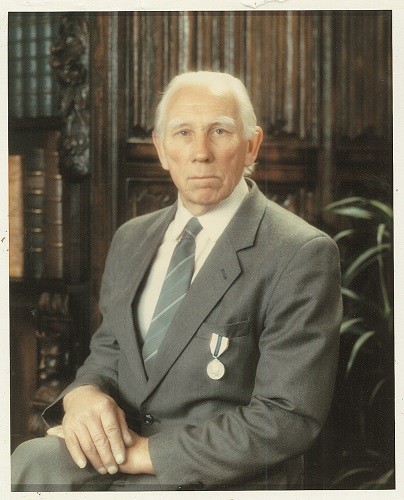
A reflection on the contribution of former stalwarts who gave to Ulster cricket....
Bob Collins didn’t make the headlines of rugby or cricket, but he was still an Icon at North of Ireland Cricket and Rugby Club. His contribution won many accolades from the club members and from afar. He was usually known as “Collins”, a title followed that from his father, but better known from outside the walls of Ormeau as Bob the Groundsman. After retirement he became Caretaker and the Security Man. His domain was “Headquarters”, the home of Ulster cricket for over 128 years. It was also his home since 1922 after he was born. He died in 2004 at the age of 80.
After he succeeded his father in 1961, the members referred to him as “Collins”. His father Thomas was appointed Groundsman in 1921. Bob was his Assistant Groundsman at the age of 17, and he followed in his father’s footsteps in his career. Thomas died 5 years later after retirement, but he had already established himself as an Institution in the club. Little did they know that Bob, now “Collins”, would become an Institution in his own right. He earned that reputation.
Thomas Collins instilled the work ethic in Bob. He was a veteran of the Great War and survived the Battle of the Somme in 1916, despite shrapnel injuries. His duty was driving a horse-drawn ammunition wagon for the Artillery in the heart of battle. Amazingly he survived, but after the War there were few jobs around. The North Members were impressed by his role in action and thought him a suitable Groundsman. He was appointed in 1921 and put his experience with horses to great effect, as a horse became an integral part of his work. After all, it was only the source of power for cutting for many years. He set up a home within the Pavilion, and Bob was born in 1922. Collins was a tremendous asset to the club, and very popular as he did so much to help the members. After 42 years he retired in 1963, and sadly died a few years later.
Bob’s introduction as a teenager plunged him into World War II, and for over 6 years Headquarters was used for a variety of purposes, including the military, cricket and rugby. The Senior Cup Final was largely played at Ormeau since the inaugural final in 1887, although occasionally at Cliftonville pre-1940. For those turbulent war years Ormeau shared with drilling the Army and the RAF. Bob did what was needed in those difficult times, but still enjoyed his sport. He was a member of North’s team when they won the prestigious Graham Cup in 1937, and his fitness was always a priority for him. He was a fully qualified Gymnastic Instructor, and he was always good with machinery. He helped to convert a Morris Cowley car with a little truck into motor gang-mowers, but later moved to a Ferguson tractor!
The post-war era took many teams to Ormeau, and when the club celebrated its Centenary in 1960, both Thomas and Bob Collins were proud to be photographed alongside the Officials, Members and Grounds Staff. The Centenary Match took place in September when North of Ireland CC played against the MCC. The club was blessed with some fine teams at every level, but particularly the 1st XI under the captaincy of Stuart Pollock with a Senior Cup and League ‘double.’ The decade started well, but sadly ended in dismay, in what is now called “The Troubles.”
Unprecedented civil disturbances, started with a Civil Rights Rally in 1968, and were infiltrated by Republican terrorists that lasted for three decades. North’s ground was in the middle of the conflict, and Bob Collins was in the centre of activities living and working at the Lower Ormeau Road alongside Shaftsbury Avenue. The Republican Hardliners infiltrated the streets in the Ormeau Road area, and after 1968, the members of North were now unwelcomed. They were defiant at the time, but eventually succumbed after attacks on the clubhouse and assaults on its members.
Nearing 50, Bob was in the frontline and suffered the worst incidents. The final straw was in 1997 when the Centenary Pavilion function room and bar were destroyed by firebombs. Bob was hospitalized in the incident. Other attempts to set fire to the pavilion had been thwarted, but after the damage in 1997 the decision to sell and go elsewhere was taken by the North Committee.
Former Ireland fast bowler Simon Corlett was on the Committee when they made this historic decision, and offered some interesting stories about Bob.
He recalls…
“An abiding memory is that on many a Saturday night, one of our esteemed members had one too many Bell's. Bob would carefully manhandle him into his own car and then drive him home. Bob's brother would drive behind him to get him back. Good old-fashioned loyal service! I also remember when the IRA left a bomb in the clubhouse, and the army guys lifted it out and then set it on the square. When he discovered this Bob came rushing out and moved it off his beloved turf himself! Apparently, his words to the soldiers were somewhat colourful. It took some time before Bob relented to Sunday play, but although he accepted the decision, we never really saw him in the ground. It seems as he was driving around Ireland with his brother Tom in his Rover.
Bob was a character and gave great service to the club.”
Bob’s health took its toll over the years, and he eventually retired in 1985 to hand over the reins to Henry Harrison from Saintfield. He continued to live at the ground, and continued to work as a Caretaker and Security man. Opening and closing gates and organising squash courts were an important role at the time in the midst of civil unrest.
He was awarded the Silver Jubilee medal in 1977 and he was thoroughly deserving of it. He had many visiting teams over the years, and everyone gave praise for the quality of the ground, both at cricket and rugby. The last match played at Ormeau was Ireland against Australia in 2001.
In his book “A Farewell to Ormeau” Wilfred Hanna spoke glowingly about Bob…
“The club shall be ever in his debt for its survival throughout this period. It is acknowledged by members that without his devotion to his beloved ‘North’ it is certain that all the club assets could have been lost and destroyed and future move to other premises impossible.”
Gone, but not forgotten… Bob Collins
JCH








